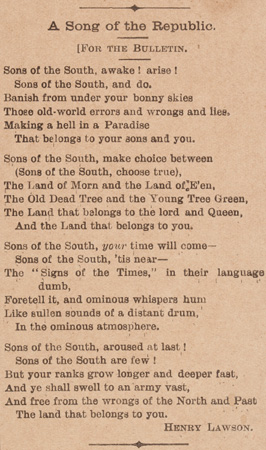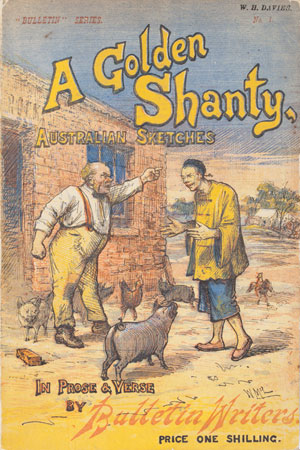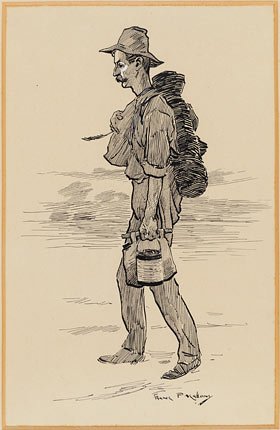Getting published
 'Song of the Republic', p.1, The Bulletin,
'Song of the Republic', p.1, The Bulletin,1 October 1887, Sydney. DL F88/10
Henry Lawson began to write poetry at the urging of his mother, Louisa Lawson. A poet and author in her own right, Louisa took a prominent part in the women's movement following the end of her marriage and move to Sydney, eventually publishing the successful women's paper, Dawn, from 1888 to 1905.
Lawson's first poems show the clear influence of his mother and her radical friends. A convinced socialist as a young man, Henry was always passionately concerned about the underdog. He became a published poet in 1887, when his poem 'A Song of the Republic' appeared in the October issue of the Bulletin. Soon after, several of his other works were also published, including 'Golden Gully' and 'The Wreck of the Derry Castle'.
At this time, the Bulletin magazine was the most significant literary journal in Australia. Its success was due to its combination of news, politics and economics, written by Australian writers for a local audience. It provided an important publishing outlet for the early work of many young aspiring Australian writers, artists and cartoonists.
JF Archibald, editor of the Bulletin, became an important figure in young Henry’s life, his kindness and tactful editing helping Lawson hone the easy, laconic yet succinct prose style of his best stories.
When Louisa Lawson bought the Republican magazine, Henry gained further writing and editorial experience as well as another publishing outlet for his own work.
> Read Henry Lawson's reminiscences about his early publishing experiences
Though Lawson may have inherited his capacity for writing from his mother, it was probably to his father that the author owed the love of humanity that illuminates the best of his work. Lawson's first published short story, 'His Father's Mate', appeared in the Bulletin on 22 December 1888, greatly to the pride of his father who died only a few day later.
This story tells the poignant tale of ten-year-old Harry Mason, nicknamed 'Isley', the island in the ocean between his father and mother (deceased). Isley spends his days helping his father to work their claim, winching buckets of mud to the surface - ever on the lookout for that elusive fleck of gold, before tragedy strikes.
'His Father's Mate', p.18-19, The Bulletin, 22 December 1888, Sydney. TN 86
Lawson's next publishing milestone was the inclusion of several of his writings in
A Golden Shanty, an anthology of short stories and verse published by the Bulletin in 1890. The book was produced in response to the request from readers for publication in 'handy form' of selected works from 'the vast mass of material' written especially for the Bulletin's pages, all chosen by FJ Broomfield and JF Archibald. Alongside Lawson's contributions, 'His Father's Mate' and 'Faces in the Street', are works from fellow Bulletin authors including Victor Daley, Henry Kendall and A.B. 'Banjo' Paterson.
In 1892, Henry Lawson was involved with Banjo Paterson and others in the Bulletin's poetic 'debate' about the merits of the bush versus city lifestyles. Based on his own childhood experiences, Lawson satirised Paterson's utopian views of bush life by highlighting its harsh realities.
Towards the end of 1892, the Bulletin gave Lawson £5 and a railway ticket to Bourke, in far north-western NSW, so he could report first-hand on the lives of bushmen and country workers. Once there Lawson picked up work in a shearing shed and swagged for six months.
>Read Henry's letter from Bourke to his aunt via the Library's catalogue
This was an important journey for Lawson who was profundly moved by the hardship of rural life and the resilience of the people living in the drought stricken outback. By the time Henry returned to Sydney, in mid 1893, he had a store of memories that provided him with a cast of characters and subject matter for many of his most celebrated short stories and verse. Lawson's accounts of the people he encountered during his outback wanderings would form the basis of much of his writing for years to come.
>Find Lawson's hand written 'On the track' stories via the Library's catalogue
The end of 1894 saw the printing of Short Stories in Prose and Verse, Lawson's first published collection. Soon after the author was contracted by Sydney bookselling firm, Angus and Robertson, to publish a volume of his verse, In the Days When the World was Wide and Other Verses (1896), followed later that year by a collection of short stories, While the Billy Boils and Other Stories. Both books were critically and commercially successful and remain an important part of Australia's literary output.

